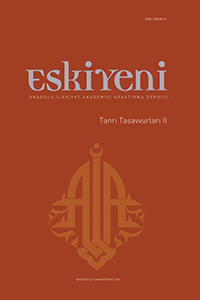İbn Sînâ ve Tûsî’ye Göre Tanrı’nın Bilgisi
Knowledge of God according to Avicenna and Tusi
Author(s): Murat DemirkolSubject(s): Philosophy, Metaphysics, Epistemology, Theology and Religion, Islam studies, Middle-East Philosophy
Published by: Anadolu İlahiyat Akademisi
Keywords: Knowledge; universal knowledge; particular knowledge; intellect; irtisam; unification;
Summary/Abstract: The knowledge of God has been taken into account by the Muslim philosophers not as a theory of knowledge but as a subject within the framework of metaphysics. Though there is no title specifically dedicated under epistemology in Islamic philosophy, man’s knowing and perception (idrak) has been analysed within the framework of both logic and soul (nafs) theories. Sensual conception has been taken into account under the former drive of two fundamental motives, namely carnal perception and actuation, whereas producing new knowledge and certainty based on premises has been studied under logic. The power of abstract knowledge is studied both in the theory of nafs in that it reaches the universal knowledge by abstracting the images derived from internal and external senses, and also analysed under metaphysics since it processes information through a active intellect and transfer of knowledge. In this article, while we analyse the knowledge of God via the works of Avicenna and Nasir al-din al-Tusi, we also take into account the comparison between the universal and self-knowledge of God and human’s universal and particular knowledge in this study, too. Thus, we partially touched upon the knowledge theories of both philosophers. The quest for conceiving the Knowledge of God requires considering the character of human’s knowledge and reasoning and putting forward the differences via comparison. In this study, the fact that how God knows himself (dhat) and others’ and how this knowledge is realised whether it is delineated (irtiṣām) in his dhat through intelligible images or in the form of unification of intelligibles with his dhat, it will be analysed through the ideas of two philosophers.
Journal: Eskiyeni
- Issue Year: 2016
- Issue No: 32
- Page Range: 29-54
- Page Count: 26
- Language: Turkish

